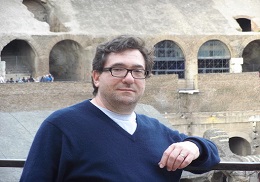CSW 2019


Computer Science Workshop 2019
1st Edition
June 11th, 2019, 9:30-16:30
Aula Magna, Chemistry Department of the University of GenovaVia Dodecaneso 35, Genova, 16146 IT
Motivation and goals
We are glad to announce the 1st edition of the Computer Science Workshop at the Department of Informatics, Bioengineering, Robotics and System Engineering (DIBRIS) at Università di Genova.
What about research in Computer Science?
Computer Science is constantly increasing in complexity with many and many new fields of research emerging. Here, at the University of Genoa, we are involved in some of these fields as Virtual and Augmented Reality, Multi-Agent systems, Data Science, Computer Graphics, Security, Machine Learning, Programming Languages, Logic, Computer Vision, Software Engineering and many others. The main goal of the workshop is discussing the many aspects of the Computer Science research fields, to present a broad perspective of this subject and look for possible (unexpected) interconnections. We are glad to host four speakers:
- Ugo Dal Lago, Università di Bologna;
- Rafael Bordini, Pontifícia Universidade Católica do Rio Grande do Sul;
- Battista Biggio, Università di Cagliari;
- Georg Gottlob, Oxford University and TU Vienna.
The presentations are aimed at providing an international view of a wide range of research topics in Computer Science. The workshop includes a lunch offered to the participants, during which all the PhD students in Computer Science are going to present their work. It is a nice opportunity for discussing, sharing new ideas, and more generally networking.
Flyer
Abstracts
How to Write Introductions, and Why Research Projects Matter - Georg Gottlob
Research results are a mind products. First and foremost, such products need to be of very good quality. However, in our times of information overflow, even the most excellent research products need marketing and “sales” promotion in order to be adequately considered by the Scientific Community. This includes publication in a suitable venue, and an effective “sales pitch” in the introduction. Moreover, research often needs further resources and thus project funding. Why is funding so important for a young researcher? This lecture will address all these issues. First, I will reveal a couple of secrets about how to write a convincing introduction, then I will make a few considerations about project funding that may eventually turn out to be useful to you. These topics will be partially covered only. However, I hope that the essentials I will talk about might still be beneficial to you, providing therewith a positive interpretation and context for the Latin half-phrase “…semper aliquid haeret”.
Wild Patterns: Ten Years after the Rise of Adversarial Machine Learning - Battista Biggio
Data-driven AI and machine-learning technologies have become pervasive, and even able to outperform humans on specific tasks. However, it has been shown that they suffer from hallucinations known as adversarial examples, i.e., imperceptible, adversarial perturbations to images, text and audio that fool these systems into perceiving things that are not there. This has severely questioned their suitability for mission-critical applications, including self-driving cars and autonomous vehicles. This phenomenon is even more evident in the context of cybersecurity domains with a clearer adversarial nature, like malware and spam detection, in which data is purposely manipulated by cybercriminals to undermine the outcome of automatic analyses. As current data-driven AI and machine-learning methods have not been designed to deal with the intrinsic, adversarial nature of these problems, they exhibit specific vulnerabilities that attackers can exploit either to mislead learning or to evade detection. Identifying these vulnerabilities and analyzing the impact of the corresponding attacks on learning algorithms has thus been one of the main open issues in the research field of adversarial machine learning, along with the design of more secure and explainable learning algorithms. In this talk, I review previous work on evasion attacks, where malicious samples are manipulated at test time to evade detection, and poisoning attacks, which can mislead learning by manipulating even only a small fraction of the training data. I discuss some defense mechanisms against both attacks in the context of real-world applications, including computer vision, biometric identity recognition and computer security. Finally, I sketch some promising future research directions.
Differential Program Semantics - Ugo Dal Lago
Giving meaning to programs through axiomatic, denotational, and operational semantics is one of the main goals of theoretical computer science since its early days. Traditionally, program semantics is built around notions of program equivalence and refinement, based on which verification and transformation techniques can be justified. More and more often, however, programs are substituted with approximately equivalent programs, or verified against imprecise specifications. Program semantics has started dealing with program differences only in recent years, through the interpretation of programs in metric spaces. We give a brief survey about the state of the art on metric program semantics, and on the inadequacy of metrics as a way to deal with program differences. We thus point at a few preliminary results on a new kind of differential program semantics, which a just-launched ERC project plans to investigate along four axes: logical relations, bi-similarity, game semantics, and linear logic.
Towards Using Agent Programming Enriched with Ontologies and Argumentation for Developing Chatbots - Rafael Bordini
In this talk, I will briefly overview the work on a platform for the development of multi-agent systems called JaCaMo. I will then discuss recent work on the integration of Argumentation Theory into that programming platform. Previous work on using Ontological Reasoning in the context of that platform will also be presented. I will then introduce recent work on a chatbot that supports hospital staff in doing bed allocation. To conclude, I will discuss future directions on the combination of both technologies and the impact they could have to the development of intelligent chatbots.
Speakers
Ugo Dal Lago
 Ugo Dal Lago is Associate Professor from 2015 and a faculty member of the Computer Science Lab at the University of Bologna since 2006. Before that, he has been a postdoc in Verona and Paris. He has been involved in many international research projects, and he co-authored more than 60 publications which appeared in journals and conference proceedings. Is the winner of the prize for the best italian doctoral thesis in theoretical computer science (2006), of the Kleene Award (2006) and of the prize for the best young researcher in theoretical computer science (2015). He has been awarded an ERC Consolidator project on Differential Program Semantics, which started on March 1st, 2019.
Ugo Dal Lago is Associate Professor from 2015 and a faculty member of the Computer Science Lab at the University of Bologna since 2006. Before that, he has been a postdoc in Verona and Paris. He has been involved in many international research projects, and he co-authored more than 60 publications which appeared in journals and conference proceedings. Is the winner of the prize for the best italian doctoral thesis in theoretical computer science (2006), of the Kleene Award (2006) and of the prize for the best young researcher in theoretical computer science (2015). He has been awarded an ERC Consolidator project on Differential Program Semantics, which started on March 1st, 2019.
Rafael Bordini
 Rafael Bordini is an emeritus member of the Board of Directors of the International Foundation for Autonomous Agents and Multiagent Systems (IFAAMAS) and emeritus member of the board of directors of the European Association for Multi-Agent Systems (EURAMAS). He was programme co-chair for the main Agents conference (AAMAS) in 2015, and has served as SPC or PC for all top AI and Agents conferences (including IJCAI, AAMAS, AAAI, ECAI). He has published over 100 conference papers and 25 journal papers; according to Google Scholar his h-index is 38. His main research interests are in programming languages and verification techniques for autonomous software systems, particularly multi-agent systems, as well as the integration of AI techniques such as multi-agent planning, argumentation, and ontologies in multi-agent systems. The main target applications are in the use of AI for the social good and sustainability, in particular human-robot teamwork in disaster rescue scenarios and healthcare.
Rafael Bordini is an emeritus member of the Board of Directors of the International Foundation for Autonomous Agents and Multiagent Systems (IFAAMAS) and emeritus member of the board of directors of the European Association for Multi-Agent Systems (EURAMAS). He was programme co-chair for the main Agents conference (AAMAS) in 2015, and has served as SPC or PC for all top AI and Agents conferences (including IJCAI, AAMAS, AAAI, ECAI). He has published over 100 conference papers and 25 journal papers; according to Google Scholar his h-index is 38. His main research interests are in programming languages and verification techniques for autonomous software systems, particularly multi-agent systems, as well as the integration of AI techniques such as multi-agent planning, argumentation, and ontologies in multi-agent systems. The main target applications are in the use of AI for the social good and sustainability, in particular human-robot teamwork in disaster rescue scenarios and healthcare.
Georg Gottlob
 Georg Gottlob is Professor of Informatics at Oxford University and an Adjunct Professor at TU Wien. His interests include database theory, AI, computational complexity, and web data processing. Gottlob has received the Wittgenstein Award (Austria) and the Ada Lovelace Medal (UK).He is an ACM Fellow, an ECCAI Fellow, a Fellow of the Royal Society, and a member of the Austrian and the German academies of Sciences, and the Academia Europaea. He chaired the Program Committees of IJCAI 2003 and ACM PODS 2000. He was the main founder of Lixto, a web data extraction software company, which was acquired by McKinsey in 2013. Gottlob was awarded an ERC Advanced Investigator’s Grant for the project “DIADEM: Domain-centric Intelligent Automated Data Extraction Methodology”. Based on results of this project, he co-founded Wrapidity Ltd, a company that specialises in fully automated web data extraction that was recently acquired by the Meltwater Media Intelligence Corporation. More recently, Georg co-founded the Knowledge Graph start-up DeepReason.ai as a spin-out of Oxford University. From 1985-1988 Georg lived in Genoa and worked at the Istituto per la Matematica Applicata of the CNR in Genoa (IMA-CNR), which was attached to the Mathematics Department of the University of Genoa. IMA-CNR was headed by Professor Jaurès Pacifico Cecconi, and Georg worked in the Group directed by Prof. Massimo Ancona.
Georg Gottlob is Professor of Informatics at Oxford University and an Adjunct Professor at TU Wien. His interests include database theory, AI, computational complexity, and web data processing. Gottlob has received the Wittgenstein Award (Austria) and the Ada Lovelace Medal (UK).He is an ACM Fellow, an ECCAI Fellow, a Fellow of the Royal Society, and a member of the Austrian and the German academies of Sciences, and the Academia Europaea. He chaired the Program Committees of IJCAI 2003 and ACM PODS 2000. He was the main founder of Lixto, a web data extraction software company, which was acquired by McKinsey in 2013. Gottlob was awarded an ERC Advanced Investigator’s Grant for the project “DIADEM: Domain-centric Intelligent Automated Data Extraction Methodology”. Based on results of this project, he co-founded Wrapidity Ltd, a company that specialises in fully automated web data extraction that was recently acquired by the Meltwater Media Intelligence Corporation. More recently, Georg co-founded the Knowledge Graph start-up DeepReason.ai as a spin-out of Oxford University. From 1985-1988 Georg lived in Genoa and worked at the Istituto per la Matematica Applicata of the CNR in Genoa (IMA-CNR), which was attached to the Mathematics Department of the University of Genoa. IMA-CNR was headed by Professor Jaurès Pacifico Cecconi, and Georg worked in the Group directed by Prof. Massimo Ancona.
Battista Biggio
 Battista Biggio (MSc ’06, PhD ‘10) is an Assistant Professor at the Department of Electrical and Electronic Engineering at the University of Cagliari, Italy, and a co-founder of Pluribus One, a startup company developing secure AI algorithms for cybersecurity tasks. In 2011, he visited the University of Tuebingen, Germany. His pioneering research on adversarial machine learning involved the development of secure learning algorithms for spam and malware detection, and computer-vision problems, playing a leading role in the establishment and advancement of this research field. On these topics, he has published more than 60 papers, collecting more than 2770 citations (Google Scholar, April 2019). Dr. Biggio regularly serves as a reviewer and program committee member for several international conferences and journals on the aforementioned research topics (including ICML, NeurIPS, IEEE Symp. S&P and ACM CCS), co-organizes three well-established workshops (AISec, DLS, S+SSPR) and he is Associate Editor for three high-impact journals (Pattern Recognition, IEEE TNNLS , and IEEE Comp. Intell. Magazine). He is chair of the TC1 on Statistical Pattern Recognition of the IAPR, a senior member of the IEEE and a member of the IAPR and ACM.
Battista Biggio (MSc ’06, PhD ‘10) is an Assistant Professor at the Department of Electrical and Electronic Engineering at the University of Cagliari, Italy, and a co-founder of Pluribus One, a startup company developing secure AI algorithms for cybersecurity tasks. In 2011, he visited the University of Tuebingen, Germany. His pioneering research on adversarial machine learning involved the development of secure learning algorithms for spam and malware detection, and computer-vision problems, playing a leading role in the establishment and advancement of this research field. On these topics, he has published more than 60 papers, collecting more than 2770 citations (Google Scholar, April 2019). Dr. Biggio regularly serves as a reviewer and program committee member for several international conferences and journals on the aforementioned research topics (including ICML, NeurIPS, IEEE Symp. S&P and ACM CCS), co-organizes three well-established workshops (AISec, DLS, S+SSPR) and he is Associate Editor for three high-impact journals (Pattern Recognition, IEEE TNNLS , and IEEE Comp. Intell. Magazine). He is chair of the TC1 on Statistical Pattern Recognition of the IAPR, a senior member of the IEEE and a member of the IAPR and ACM.
Our sponsors
We are very glad to be sponsored by three companies present in our territory. During the event members of the companies will be there to present their business goals and for recruitment.
Organization
This event is thought and fully organized by the organization of PhD students in Computer Science. This organization was born nearly two years ago with the aim of sharing knowledge and discuss the on-going research in our department. We organize weekly seminars and other events during the year. The members of the organization: Vanessa D’Amario, Luca Franceschini, Francesco Dagnino, Luca Demetrio, Davide Garbarino, Chiara Bassano, Gaurvi Goyal, Elia Moscoso Thompson, Andreas Scalas, Claudio Mancinelli, Matteo Moro, Elena Nicora and Veronica Tozzo.
A special thanks to Danilo Franco for handling the event on the Master degree side and for the help. A special thanks to SUSI Illustration for the graphics and the logos.


